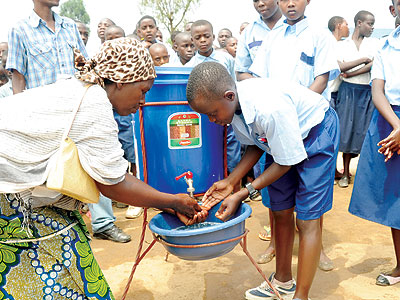About 2.6 billion people globally have no access to improved sanitation, says a new study.


About 2.6 billion people globally have no access to improved sanitation, says a new study.
The study was carried out by the Institute of Policy Analysis and Research of Rwanda (IPAR) together with the University of Surrey, Makerere University and Victoria Institute for Research on Environmental Development.
It sought to establish the possible solutions to the problem of sanitation in informal settlements in the regional cities of Kigali (Kenya), Kisumu and Kampala (Uganda) under the 3K-SAN project
Over 1.2 million children below five years worldwide die of sanitation-related illness.
Presenting the preliminary findings of the study at a stakeholders meeting in the City of Kigali, yesterday, Aime Tsinda, a researcher with IPAR, said settlements in the three regional cities where the study was conducted are characterised by high levels of poverty, illiteracy, unemployment, poor housing, limited access to quality health care and poor drainage systems.
In Kigali, the study was conducted in Gatsata and Kimisagara. "It shows that pit-latrines in these areas are often poorly maintained and rarely emptied. There are also few suction trucks available to empty soakage pits and septic tanks,” Tsinda explained.
"Even when there is a possibility to empty the pit-latrines, the sludge is not always disposed in a proper manner,” he adds.
He, however, said this can be improved in Kigali if the city can get a sewerage system since it lacks a central treatment facility for sewerage or a system of sewers.
Dr. Katrina Charles, the research manager for the 3-KSAN project, said 62 per cent of the urban population in Sub-Saharan Africa live in informal settlements characterised by poor sanitation which leads to poor health.
Katrina adds that pit-latrines in these areas are often poorly maintained, shared and sometimes constructed using sub-standard facilities.
Most people living in these areas are tenants and thus not willing to invest in sanitation in their areas of residence, she said.
She urged landlords to promote proper sanitation facilities on their property since most tenants are reluctant to invest in this area.
The researchers proposed that Eco-san bio gas toilets and smaller vacuum tankers be used in the City of Kigali to overcome the problem of accessibility.
Eng. Francis Musinguzi, the acting country manager, Water Aid Rwanda, said as they discuss the option of empting pit-latrines, there is need for governments to designate special areas for disposal to avoid disposal systems that may promote open defecation
John Mugabo, an officer in charge of hygiene in the City of Kigali, said there is ignorance among the public on empting latrines.
"People are used to the culture of constructing new pit-latrines only when the one in use gets full, but also often times, they are not aware of the empting services or think that the cost of empting is higher than that of digging a new pit-latrine,” he explains.
Mugabo says the report comes in handy as it will enable the city authorities to come up with more affordable and sustainable sanitation solutions.
"If the eco-san toilets are affordable, then it will be implemented,” Mugabo said.
He said the City of Kigali has also invested in other technologies for empting pits like use of organic digesters for natural treatment to decompose waste.
He also acknowledged the need for public sensitisation on sanitation and collaboration between landlords and tenants if this is to be achieved.


